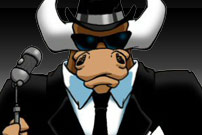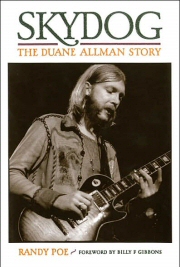 With the temperature dropping, it's time to find someone to keep you warm. Find your hookups with our online dating guide!
With the temperature dropping, it's time to find someone to keep you warm. Find your hookups with our online dating guide!
Allman Story
- Biography
- 2008
- Buy the book
Reviewed by Greg M. Schwartz
ack in 2003, Rolling Stone magazine ranked Duane Allman as the second-greatest guitarist of all time, putting only Jimi Hendrix above him. Yet while Jimi has had numerous bios published over the years, Duane has had next to none. Grammy nominee and award-winning author Randy Poe rectified that with the first edition of “Skydog” in 2006, which has now been updated and expanded for its paperback release, featuring a foreword from Billy Gibbons of ZZ Top.
Based on hundreds of hours of interviews with those who knew him, “Skydog” is a must-read for any fan of the Allman Brothers Band. It will also appeal to blues and classic rock fans interested in a more detailed history of one of the most influential bands ever to crank up the amps. Poe does a stellar job of tracing the life story of a musician who passed away over three decades ago. We learn how Duane and younger brother Greg’s war vet father was murdered by another crazy vet when they were just three and two years old. Poe traces how this influenced Duane’s reckless ways with drugs and motorcycles, eventually leading to his untimely departure from the planet in a motorcycle accident at age 24.
But Duane Allman’s story wasn’t just sex, drugs and rock ‘n’ roll. As with peers like Hendrix and Jerry Garcia, Allman apparently had an extra-dimensional spiritual character that drew people to him like moths to a flame. Poe tells the tales, but he also delves deeply into the music, detailing the particulars of what made the Allman Brothers Band’s music so special. Poe also goes deep into the making of the classic Layla and Other Assorted Love Songs album that Allman collaborated on with Eric Clapton’s Derek and the Dominoes project. In fact, readers will learn far more about that album in “Skydog” than from Clapton’s own autobiography (which focused more on Slowhand’s personal life than his recording career.) For instance, Poe reveals how it was Allman, not Clapton, who came up with the classic signature riff that opens the title track.
After cutting their chops in Florida, Duane and Greg went west to Los Angeles and landed a record deal with their band Hourglass. But it didn’t take off. Duane left Greg in L.A. and went back to Florida, and it was here that things jelled. Duane had become an in-demand session player, but longed to pursue his own vision. It wasn’t long before he hooked up with the other members of what would become the ABB. Poe describes the moment they all knew they had something special at a jam session on March 23, 1969.
He writes of how Duane later recalled it: “We set up the equipment and whipped into a little jam, and it lasted two and a half hours. When we finally quit, nobody said a word, man. Everybody was speechless. Nobody’d ever done anything like that before…Right then, I knew. I said, ‘Man, here it is – here it is!’”
Duane then stood in front of the open doorway and said, “Anybody in this room not gonna play in my band, you’re gonna have to fight your way outta here!” He knew they still needed a singer, though, and was certain that only brother Greg could fill those shoes. Greg was soon recalled from the West Coast, and the ABB was born.
Musicians will particularly enjoy how Poe goes deep into the writing of the band’s classics, their time woodshedding after a move to Georgia, and the making of their early albums and life on the road. One tale reveals how Greg Allman came up with “Whipping Post” and didn’t realize it was in 11/4 time until Duane informed him. The ABB were true road warriors, and Poe relates many tales here, including Duane’s thoughts on other stars they would share the stage with.
“He could sing ‘Happy Birthday’ and bring tears to your eyes, man,” says Allman of B.B. King. When the ABB played with the Grateful Dead at the Fillmore East in February of 1970, a lifelong mutual appreciation society was formed. Before the first show was over, most of the ABB were onstage with the Dead, jamming on “Dark Star” and “Turn on Your Lovelight.”
“I love the Dead. As for Jerry Garcia, Jerry Garcia could walk on water. He could do anything any man could ever do. He’s a prince,” Allman would tell DJ Dave Herman. Gregg Allman is quoted on the musical philosophy that made the ABB forerunners of the modern jam band explosion. “All the arrangements are pre-rehearsed down to the letter,” he said. “But with the solos – you can take it as long as you want. When it comes to the solos, each soloist goes around twice – it’s never just once. It takes twice to get out what you really want to say.”
Other interesting tidbits include how Duane’s daughter Galadrielle, born in August 1969, was named after a character from Tolkien’s “Lord of the Rings.” Later, tour manager Twiggs Lyndon was arrested for stabbing and murdering a promoter over a pay dispute; Poe writes how he would incredibly get off on a temporary insanity plea with his lawyer arguing that “touring with the ABB was enough to drive anyone insane.” A few moments of virtually incoherent bassist Berry Oakley on the witness stand apparently helped prove the argument.
Poe notes that Allman rarely spoke in interviews about anything other than music. But he quotes him in one interview just two months before his death, where he speaks about band breakups: “Drugs is one thing that will do it, and do it quick.” Allman knew from experience, having developed some serious drug habits that included powdered heroin (though he was adamantly opposed to needles.) The endless touring put pressure on the band to find ways to keep themselves going. But in the fall of ’71, Allman decided to check himself into rehab for fear of watching the band otherwise burn itself out. It was most ironic that the fateful motorcycle crash that took his life occurred just days after he got out.
Poe describes the aftermath, from the shock amongst the band family to 18,000 fans singing the slide lead to “Statesboro Blues” at an Auburn University show shortly after Duane’s death. Poe also details the continuing legacy of the band, with historical details and quote after quote that delves into that legacy, as well as a detailed discography of all the band’s releases.
Perhaps no quote better summarizes Duane Allman’s mindset and contribution to the world than one Poe finds in one of Allman’s last interviews, where he’s asked what he’s doing to help the revolution:
“I’m hitting a lick for peace – and every time I’m in Georgia, I eat a peach for peace. But you can’t help the revolution, because there’s just evolution. I understand the need for a lot of changes in this country, but I believe that as soon as everybody can see just a little better, and get a little hipper to what’s going on, they’re going to change it. Everybody will – not just the young people, everybody is going to say, ‘Man, this stinks. I cannot tolerate the smell of this thing anymore. Let’s eliminate it and get straight with ourselves.’ I believe if everybody does it for themselves, it’ll take care of itself.”
It’s no wonder, then, that the remaining members of the Allman Brothers Band will be joining the remaining members of the Dead for an October 13th benefit concert for the Barack Obama campaign at Penn State University.
You can follow us on Twitter and Facebook for content updates. Also, sign up for our email list for weekly updates and check us out on Google+ as well.











